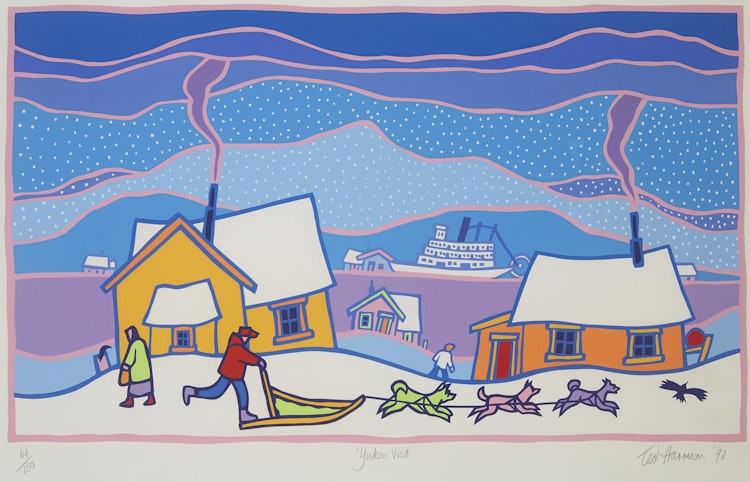Yukon Visit by Ted Harrison

Ted Harrison
Yukon Visit
serigraph
signed, titled, dated ‘90 and numbered 64/150 in the lower margin
10 x 17.5 ins ( 25.4 x 44.5 cms ) ( subject )
Auction Estimate: $300.00 - $500.00
Price Realized $1,035.00
Sale date: September 20th 2017
Share this item with your friends
Ted Harrison
(1926 - 2015) Order of Canada
Harrison was born in Durham County, Northern England in 1926. Ted attributed his early interest in art and design to the encouragement from his parents, particularly his mother who had an interest in fashion design and photography. In 1943, he enrolled in the West Hartlepool College of Art and began to study art and design, but like other young men at the time, his education was interrupted by National Service. He served with the British Army Intelligence Corps in India, Egypt and East Africa and after his release studied at the West Hatlepool College of Art where he graduated with his National Diploma in Design in 1950. The following year he was awarded the Art Teachers’ Diploma at Kings’ College of the University of Durham. He later travelled to the Far East and taught school in Malaya and New Zealand.
In 1967 he moved to Canada in a stage of travel on his way to New Zealand with his wife and son. They stopped at Carcross, Yukon Territory and decided to settle there. He taught at the Indian residential school and in 1970 was appointed the principal of the Carcross Territorial School. In 1970 as well, he held his first major exhibition in Canada at the Robertson Galleries, Ottawa. In the summer of 1971 he moved to Whitehorse to establish the first fine arts course in the Yukon and teach at the Yukon Vocational and Technical Training Centre.
Robert Smyth viewing his 1976 show in Ottawa noted, “On first arrival in the Yukon he felt dominated by the mountains. Like Lawren Harris, he has been inspired to create bold stripes of rhythm from their vastness. Often, great expansive skies are filled with this same churning rhythm, made all the more pulsating by the dissonant colour harmonies. ‘Deserted Village’, a few skeletal buildings arranged in front of wildly patterned mountains cape whose turbulence continues to work its way up into the sky above, in full of this vibration. Here colour and rhythm work to good advantage, creating an animated and well-controlled surface. The cadence colour and line is also well-handled in ‘Ross River Fire,’ where spiral tongues of liquid flames spew out angrily from a burning frame house. One forlorn figure holding a battered teddy bear looks. On from the surrounding snow. Somehow, the sentiment is unforced and sincere.”
After 1979, Harrison began to work as an artist full time. In 1993, he moved to Victoria, British Columbia, where he lived the remainder of his life.
Source: "A Dictionary of Canadian Artists, Volume II”, compiled by Colin S. MacDonald, Canadian Paperbacks Publishing Ltd, Ottawa, 1979

